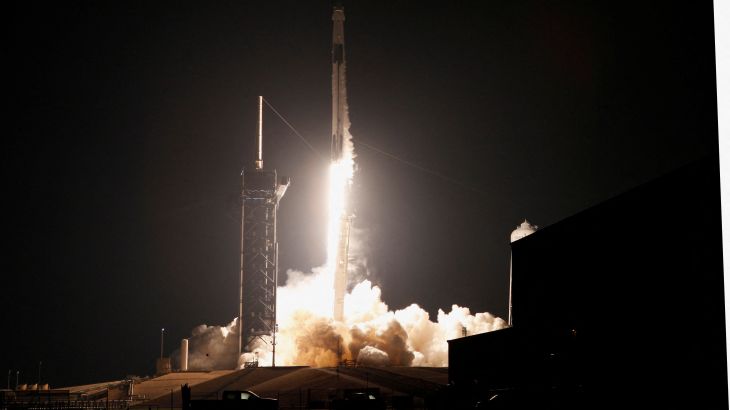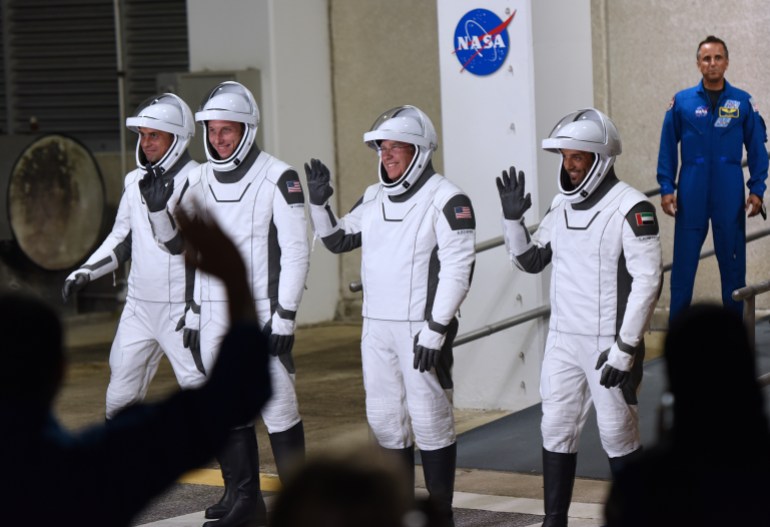SpaceX crew docks at International Space Station
The autonomously flying spacecraft, carrying four crew members, docked successfully on Friday morning.

A SpaceX Crew Dragon capsule has arrived safely at the International Space Station (ISS), carrying two US astronauts, a Russian cosmonaut and a United Arab Emirates astronaut to begin a six-month science mission.
The autonomously flying spacecraft dubbed Endeavour docked at the space station shortly after 06:40 GMT on Friday, nearly 25 hours after launching from NASA’s Kennedy Space Center in Cape Canaveral, Florida.
Keep reading
list of 3 itemsMusk says SpaceX cannot fund Ukraine’s Starlink ‘indefinitely’
SpaceX fires up giant Starship rocket engines in key test
The coupling was confirmed as the ISS and capsule flew in tandem at 28,164 km/h (17,500 miles per hour) some 240km (250 miles) above Earth across the coast of East Africa, according to a live NASA webcast of the rendezvous.
The four-member team was assigned to conduct more than 200 experiments and technology demonstrations on board the space station, ranging from research on human cell growth in space to controlling combustible materials in microgravity.
Some of the research will help pave the way for future long-duration human expeditions to the Moon and beyond under NASA’s Artemis programme, its successor to Apollo, the US space agency said.
The ISS crew is also responsible for performing maintenance and repairs on board the station, and to prepare for the arrival and departure of other astronauts and cargo payloads.
Designated Crew 6, the mission marks the sixth long-duration ISS team that SpaceX has flown for NASA since the private rocket venture founded by billionaire Elon Musk began sending American astronauts to orbit in May 2020. Musk is CEO of electric carmaker Tesla and social media platform Twitter.
The latest crew was led by Stephen Bowen, 59, a former US Navy submarine officer who has logged more than 40 days in orbit as a veteran of three Space Shuttle flights and seven spacewalks.

Fellow NASA astronaut Warren “Woody” Hoburg, 37, an electrical engineer, computer science expert and commercial aviator designated, was making his first spaceflight.
The Crew 6 mission was also notable for its inclusion of UAE astronaut Sultan al-Neyadi, 41, the second person from his country to fly to space and the first to launch from US soil as part of a long-duration space station team.
Rounding out the four-man Crew 6 was Russian cosmonaut Andrey Fedyaev, 42, who, like al-Neyadi is an engineer and spaceflight rookie designated as a mission specialist for the team.
Fedyaev is the second cosmonaut to fly on board an American spacecraft under a renewed ride-sharing deal signed in July by NASA and the Russian space agency Roscosmos, despite heightened tensions between Washington and Moscow over Russia’s invasion of Ukraine.
On arrival, the crew prepared to conduct a series of standard leak checks and to pressurise the passageway between the capsule and the ISS before they could open the hatch to the interior of the space station.
The Crew 6 team will be welcomed on board the space station by seven current ISS occupants – three NASA crew members, including commander Nicole Aunapu Mann, the first Indigenous American woman to fly to space, along with three Russians and a Japanese astronaut.
Those seven are expected to end their mission and depart the space station this month. Four will return in the SpaceX Dragon they rode to orbit in October, and three others will ride home in a Russian Soyuz spacecraft flown empty to the ISS last week to replace one that sprang a coolant leak while docked to the station in December.